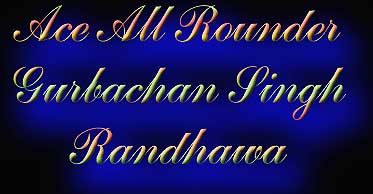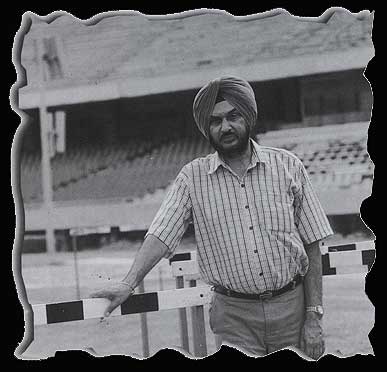

GURBACHAN SINGH RANDHAWA
Born: June 6, 1939
Village: Nangli (Dist.Amritsar,Punjab)
OLYMPICS: 1960 (Rome) 1964 (Tokyo)
At the 1962 Jakarta Asian Games, Randhawa proved himself to be the best in the continent in the tough ten-event decathlon. His tally of 6,739 points gave him the gold with silver medallist Shosuke Suzuki of Japan trailing by almost 550 points. Randhawa later set the National record of 6,912 points, a mark that would remain unbroken for 10 years. At Jakarta he proved his versatility by also reaching the finals of the 110 metres hurdles and the javelin, finishing fifth in both. A shoulder injury after Jakarta forced him to switch from the decathlon to concentrate on the hurdles. He gives credit to the Hungarian coach Jozef Kovacs, who was a visiting coach at the National Institute of Sports in Patiala, for teaching him the art of warming-up.
Like Milkha Singh four years before, Randhawa too was given the opportunity of competing extensively in Europe before the 1964 Tokyo Olympics and this helped him immensely when it came to the big occasion. At Tokyo, the hurdler was given the honour of being the standard-bearer for the Indian contingent. Randhawa remembers the race well. "Tokyo in October had a fair amount of rain. We were praying for good weather as the track was of cinder. But despite the heavy downpour, it remained firm."
The line-up for the 110 metres
hurdles was an impressive one. A total of 37 competitors from 23 nations were
trying for the eight places in the final to be run on October 18. But one of the
front-runners, Willie Davenport who had won the US Olympics trial, was eliminated
after suffering a leg injury in the semi-finals. He would win the gold in 1968.
There were five heats to decide the finalists with the first three from each heat
and the fastest loser qualifying for the semi-finals.
In his heat, Randhawa
was in lane four, which was an advantage as he could keep an eye on his rivals
on both sides. Recalls Randhawa: "Because of my lack of basic speed I was
not good at starts. I took off rather slowly. But my initial hard training in
so many different events had given me a lot of endurance and staying power. That
came in handy. I covered a lot of ground between the fifth and eighth hurdles
and almost caught up with American Hayes Jones and Frenchman Marcel Duriez. I
finished fourth in 14.3 seconds. But my painful wait was over when it was announced
that I had qualified for the semi-finals as the fastest loser."
In the
semi-finals Randhawa was pitted against England's John Parker, Dureiz, Anatoly
Mikhailov (USSR), Giorgio Mazza (Italy), Lazaro Betnacourt (Cuba), Davenport (US)
and Valentine Chistyakov (USSR). He had clocked better timings than three of his
rivals and was confident of making it to the final. Chistyakov jumped the gun
twice and was disqualified. "It was a tough race," Randhawa recalls.
"My joy knew no bounds when I looked at the giant scoreboard to see that
I had finished second in a personal best timing of 14 seconds which was also a
national record." The final was to be staged only 45 minutes later, just
enough time for a massage and a quick nap.
The final had a line-up consisting
of two Americans, one Soviet, a Frenchman, three Italians (they were battling
with Americans for supremacy in the high hurdles) and the lone Indian. In the
words of Randhawa: "Once off to the start, everything was forgotten. Again
I had a slow start but I surged smoothly ahead of Duriez. Up front the Italians
Mazza and Giovanni Cornacchia were struggling. Duriez tripped on the final hurdle
and that gave me a slight advantage, allowing me to catch up with him at the tape."
Americans
Hayes Jones and H. Blaine Lindgren had run evenly for almost the entire race.
But Lindgren started his lean too early and was pipped at the tape. Jones won
in a time of 13.6 seconds, below the world record of 13.2 held jointly by Martin
Lauer and Lee Calhoun. Lindgren was second in 13.7. Mikhailov came third in 13.7,
the same time clocked by the silver medallist. Italy's Eddy Ottoz, who was to
claim the bronze four years later, took fourth place in 13.8.
As for Randhawa:
"I had barely recovered from the effort when I saw the scoreboard. Lights
lashed on it, but soon they were put off. When they came on again, my name was
at the fourth spot. But they went off again. When the lights returned I was in
the fifth spot. The timing was 14 seconds". Following Randhawa were Duriez
(also 14 seconds), Cornacchia and Mazza (both 14.1), showing how close the finish
was.
"I have no regrets", Randhawa says years later, looking
back at Tokyo. "Maybe I should have broken the 14-second barrier. I have
had my share of bad luck in life. But I must tell you that I was lucky at Tokyo
to get into the semis as the fastest loser". Randhawa's is a sporting family.
His father was a well-known athlete in Punjab while his son Ranjit followed his
footsteps and also took to hurdling in the 90s.
Like Milkha Singh's records,
Randhawa's too have stood the test of time. After 40 years the 14-second barrier
is yet to be broken by any Indian hurdler. His national record in the decathlon
was broken after 12 years and that too by one of his own pupils, Vijay Singh Chauhan.
There is a general feeling that had the facilities in his days been better, Randhawa
would have reached world heights in the decathlon. The following are the best
marks which Randhawa set at the national level: Decathlon: 6,912 points; 110 metres
hurdles: 14.0 seconds; long jump: 24 ft. 4 and a half inches; javelin: 210 feet;
high jump: 6 ft. 7 in. Versatile indeed!